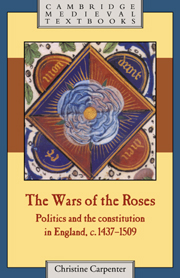Book contents
- Frontmatter
- Contents
- List of illustrations
- Preface
- Introduction
- 1 Sources and historiography
- 2 The governance of England in the fifteenth century I: kings, kingship and political society
- 3 The governance of England in the fifteenth century II: nobility, gentry and local governance
- 4 The Lancastrian kings to c. 1437
- 5 Henry VI's adult rule: the first phase c. 1437–1450
- 6 The road to war: 1450–145
- 7 The end of Lancastrian rule: 1455–1461
- 8 Edward IV's first reign: 1461–1471
- 9 The triumph of York: 1471–1483
- 10 Richard III and the end of Yorkist rule: 1483–1485
- 11 Henry VII and the end of the wars: 1485–1509
- 12 Conclusions
- Bibliographical notes
- Index
- Cambridge Medieval Textbooks
1 - Sources and historiography
Published online by Cambridge University Press: 05 June 2012
- Frontmatter
- Contents
- List of illustrations
- Preface
- Introduction
- 1 Sources and historiography
- 2 The governance of England in the fifteenth century I: kings, kingship and political society
- 3 The governance of England in the fifteenth century II: nobility, gentry and local governance
- 4 The Lancastrian kings to c. 1437
- 5 Henry VI's adult rule: the first phase c. 1437–1450
- 6 The road to war: 1450–145
- 7 The end of Lancastrian rule: 1455–1461
- 8 Edward IV's first reign: 1461–1471
- 9 The triumph of York: 1471–1483
- 10 Richard III and the end of Yorkist rule: 1483–1485
- 11 Henry VII and the end of the wars: 1485–1509
- 12 Conclusions
- Bibliographical notes
- Index
- Cambridge Medieval Textbooks
Summary
The Wars of the Roses have been a problem to historians almost from the moment they occurred. Contemporary or near-contemporary narrative accounts are largely devoid of any explanation for what happened. The vigorous monastic historical tradition of earlier centuries was by this time largely defunct. In the fifteenth century its place was taken by a number of town chronicles, mostly from London, which have interesting moments but tend to purvey bitty information, interspersed with lists of urban officers and accounts of urban events, and lack the unity and penetration of many earlier works. There are a small number of accounts of particular episodes and periods in the Wars of the Roses, written, it seems, by people close to the participants and events. These include ‘Warkworth's Chronicle’ (on the first fourteen years of Edward IV), the ‘Arrivall’ (dealing with Edward IV's return in 1471), and the ‘Chronicle of the Lincolnshire Rebellion’. The best and most penetrating of these is undoubtedly the ‘Croyland Continuations’, covering the period from 1459 to 1486.
Towards the end of the period, the new ‘humanist’ history begins to appear, not with entirely beneficial effects. It is much more coherent but prone to moralising and to putting words in the mouths of historical figures. Dominic Mancini's ‘Usurpation of Richard III’ is, on the face of it, a straightforward account of events by an informed observer and it has in the past been treated as a reliable source.
- Type
- Chapter
- Information
- The Wars of the RosesPolitics and the Constitution in England, c.1437–1509, pp. 4 - 26Publisher: Cambridge University PressPrint publication year: 1997



